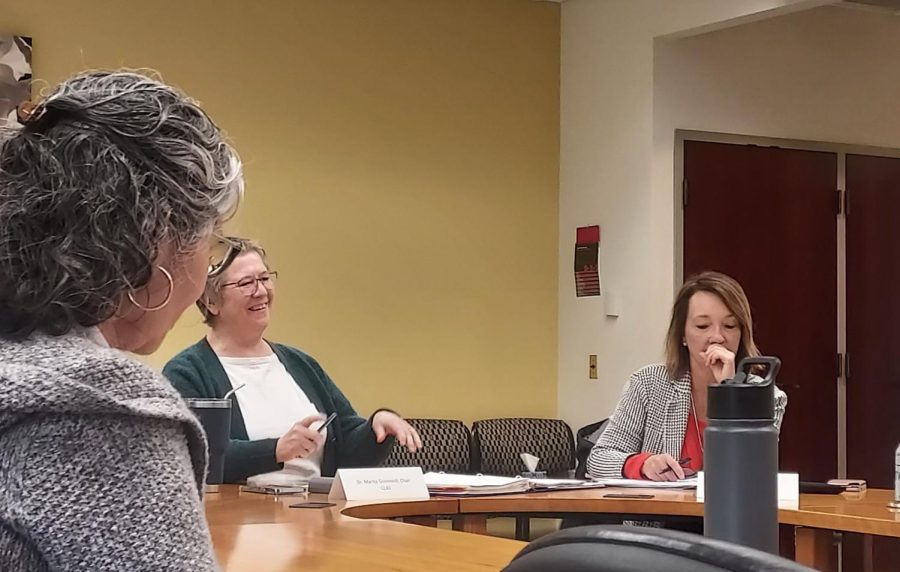CAA meets quorum, discusses changing bylaws
Council of Academic Affairs Chairperson, Marita Gronnvoll, and Cindy Richardson at a CAA meeting on Thursday.
October 14, 2022
The Council of Academic Affairs reached quorum at their meeting on Thursday after having an unofficial meeting last week and discussed solutions to the struggle of reaching quorum.
CAA is required within their bylaws to have at least six voting members to be present to reach quorum. If quorum is not met, CAA can not vote or motion on any items and the meeting will be an unofficial one.
At an unofficial meeting, there can only be discussions.
Currently, CAA only has eight voting members on the council meaning only two members can be absent or quorum will not be met.
One of the solutions for the issue of meeting quorum is voting to change the bylaw from at least six voting members present to two-thirds of the total voting members, per Robert’s Rules of Order.
Robert’s Rules of Order is a manual of parliamentary procedure to ensure meetings remain democratic and orderly.
By changing to a two-thirds requirement, only five voting CAA members would need to be present to reach quorum.
While only less by one person, the meeting on Oct. 6 would have reached quorum if CAA’s bylaws followed this rule.
Another solution, one CAA has been struggling with for months, is obtaining more CAA members.
Currently, one college and the student body do not have a representative on CAA.
The student body representative is someone from Student Senate, but at midterms the senate have yet to elect anyone to CAA.
The College of Health and Human Services, CHHS, have yet to send someone as a representative on CAA.
Originally, CAA’s bylaw requiring six voting members was set because CAA is meant to have at least 10 voting members during the fall and spring semesters.
This would have allowed four voting members to be absent and CAA would still reach a quorum.
However, with CHHS and Student Senate not sending representatives to be on CAA, currently only two members can be absent.
One idea as an option in a worse case scenario is for CAA to refuse to add agenda items for proposals from CHHS until CHHS has a representative added.
This is a part of a list of potential options CAA is considering to find a solution to the current problems, which will be listed in the minutes of Thursday’s meeting along with an email sent out to the necessary members within the colleges.
CAA unanimously approved a revision to the political science minor program.
The revisions included making the minor simpler and opening more opportunities for students in other programs to complete the minor.
Originally, there were specific political science courses required for the minor, but now the credit hours needed can be fulfilled by any political science courses.
To achieve the minor under this revision, students need 18 total credit hours in political science courses with nine of the credit hours from 3000 or higher level political science courses.
A new political science course, PLS-1500, was unanimously approved by CAA with one revision to the proposal.
PLS-1500 Political Science Forum is a new course to help new political science majors to learn about the major concentrations, resources and opportunities available for students in the political science program.
The course is a one credit hour face-to-face lecture course intended to first be available in the Fall 2023 semester.
There are no prerequisites for the courses, it can only be taken once and required for all political science majors of new transfer or freshmen students with current students having the option to follow the original catalog requirements, but all majors are able to take the course.
CAA unanimously approved a proposal to revise the political science major program to include the approved Political Science Forum course and update and organize the language in the catalog for the program.
CAA unanimously approved two more proposals to revise two political science major options to also include Political Science Forum and update and rearrange the listing of courses in the catalog.
The two political science major options revised were the Civic & Nonprofit Leadership option and the International Studies option.
A revision to the electrical engineering program was unanimously approved by CAA. Originally, the proposal was voted on at their meeting on Oct. 6, but CAA did not reach quorum making any votes or motions void.
This action item was discussed at last week’s unofficial meeting.
CAA voted on the item with no discussion and unanimously approved it.
The revision changed a core requirement course in the electrical engineering program, the internship course, to be an elective course.
Madelyn Kidd can be reached at 581-2812 or at [email protected].




















































